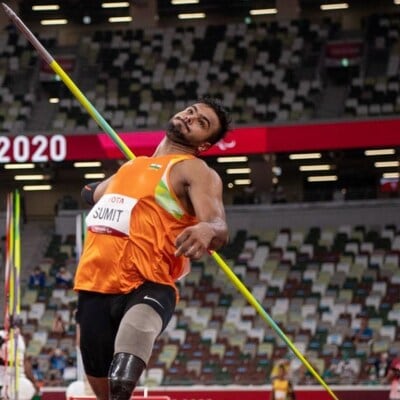[ad_1]
Inspired by the country’s armed forces and cricket star Virat Kohli, a determined Kumar Nitesh sparkled with a gold medal on debut as India’s para-badminton players joined javelin throw champion Sumit Antil in ensuring that the nation celebrated its best day at the ongoing Paralympic Games.
Thanks to their heroics, India remained on course for a record-breaking medal haul.
The 29-year-old engineering graduate from IIT-Mandi, who lost his left leg in a train accident back in 2009, won the top honours in the men’s singles SL3 category, defeating Tokyo silver-medallist Daniel Bethell of Britain 21-14 18-21 23-21 in a gruelling final that lasted over an hour.
Later in the evening, Antil hogged the limelight with his exploits as he became the first Indian man to defend Paralympic title by winning the javelin throw F64 final with a Games record of 70.59m.
The 26-year-old world record holder from Sonipat in Haryana bettered his own earlier Paralympic best of 68.55m set in Tokyo while winning the gold three years ago.
His world record stands at 73.29m.
Antil is the second Indian overall after shooter Avani Lekhara to defend a Paralympic title.
F64 category is for athletes with problems in the lower limb(s), those competing with prosthesis or affected by leg length difference.
Before Antil entered the scene, Nitesh’s gold was icing on the cake on a day when India also clinched silver medals through discus thrower Yogesh Kathuniya (F56) and para-shuttlers Thulasimathi Murugesan (SU5) and Suhas Yathiraj (SL4), who had won a silver in the Tokyo Games as well. A bronze also came from a para-shuttler in Manisha Ramadass (SU5).
India also tasted success in archery after the duo of Sheetal Devi and Rakesh Kumar staged a remarkable comeback after the heartbreak in the semifinals to claim the bronze medal with a 156-155 win over Italy’s Eleonora Sarti and Matteo Bonacina in mixed team compound open competition.
It is only the second time that India has won a medal in Paralympics in archery. Harvinder Singh bagged an individual bronze at the Tokyo edition of the Games three years ago.
Sheetal, 17, also became the first Indian woman to win an archery medal at the quadrennial showpiece.
The country found itself in the top-20, thanks to a haul of 14 medals so far. It is aiming to better the 19 medals achieved in Tokyo.
Nitesh’s gold was the second of the ongoing Games after wheelchair-bound shooter Avani Lekhara’s top finish in the women’s 10m air rifle (SH1) event last week.
“I have lost in such situations against him and didn’t want to make the same mistakes… I told myself I should keep fighting for each point. At 19-20 in decider also, I told myself to stay there and make him earn the point,” Nitesh said of his rival, who had beaten him nine times in the past.
Nitesh, who aspired to follow in his father’s footsteps and join the armed forces before the devastating accident left him despondent, was tenacity personified in his match against Bethell.
The Haryana lad, who competes with a prosthetic leg, was a footballer before the accident and was inspired to resume his sporting career as a shuttler after watching army veterans without limbs showing the spirit to carry on.
“I also admire Virat Kohli because the way he has converted himself into a fit athlete,” the world number three told PTI before the final.
For discus thrower Yogesh Kathuniya it was a second consecutive Paralympic silver medal after a season’s best effort of 42.22m.
The 27-year-old hurled the discus to the podium-clinching distance in his very first attempt to add to the silver he won in the Tokyo Paralympics three years ago.
Brazil’s Claudiney Batista dos Santos registered a hat-trick of Paralympic gold medals, creating a new Games record with an effort of 46.86m in his fifth attempt.
The F-56 classification covers limb deficiency, leg length difference, impaired muscle power and impaired range of movement.
At the age of 9, Kathuniya developed the Guillain-Barre syndrome, a rare autoimmune condition which causes numbness, tingling and muscle weakness that can progress to paralysis.
He was bound to the wheelchair during his childhood but overcame the odds with the help of his mother Meena Devi, who learnt physiotherapy to help him regain muscle strength to walk again. His father has also served in the Indian Army.
“For some time, I’m winning silver only … Gaadi atak gayi hai (I’m stuck on silver). Now I want gold,” a rather disappointed Kathuniya said.
Shuttler Murugesan, on the other hand, was competing in her maiden Paralympics and would go back happy after clinching a silver on debut. She lost 17-21 10-21 to China’s defending champion Yang Qiuxia in the final.
Her classification covers upper limb impairment, which may or may not affect the playing hand.
The second-seeded Manisha, who lost to Murugesan in the semifinals, outplayed Danish third seed Cathrine Rosengren 21-12 21-8 to claim the bronze medal.
Later, top-seeded Suhas was outplayed by 9-21 13-21 by Frenchman Lucas Mazur in the SL4 men’s singles final.
The SL4 classification covers impairment in lower limbs that hampers walking and running balance. Suhas was born with a congenital deformity in his left ankle that affects his balance.
(Only the headline and picture of this report may have been reworked by the Business Standard staff; the rest of the content is auto-generated from a syndicated feed.)
First Published: Sep 03 2024 | 12:18 PM IS
[ad_2]
Source link

